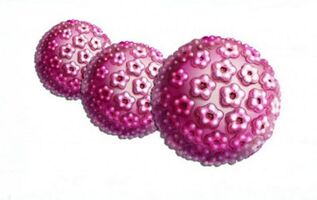
The papilloma virus can stay in the human body for a long time and will not manifest itself in any way. It is only activated when the immune system is weakened. In most cases, infection does not bring special risks, but under certain factors, some of its virus strains may degenerate into tumor diseases. This has already threatened human life. It is impossible to completely eliminate pathogenic microorganisms. Therefore, it is very important to understand the transmission mode of human papillomavirus to reduce the risk of HPV infection.
Virus and its carrying characteristics
Human papillomavirus causes the formation of benign tumors on the skin and mucous membranes. They look like a nipple, protruding a few millimeters from the surface. Usually, this kind of increase occurs when the body's defenses weaken. Usually, a person lives quietly, even temporarily not thinking that "I can be or not be alone". Why papilloma is formed:
- Frequent hypothermia or overheating;
- The presence of accompanying diseases;
- Malnutrition;
- There are bad habits;
- Frequent stress, depression, and exhaustion;
- Lack of vitamins, minerals and other nutrients.
90% of the world’s residents are carriers of papillomavirus. The immediate question is whether human papillomavirus is contagious. The answer is yes. No one is 100% insured for infection. Therefore, it is very important to understand how to get HPV (Human Papillomavirus).
How does the human papillomavirus spread
Given the high probability of being infected with HPV, there is usually a question of how the infection (human papillomavirus) is spread. Knowing the answer to this question can greatly reduce the risk of infection. Pathogenic microorganisms spread from person to person. These are the most common routes of infection. Infection contact method:
- Sexually transmitted HPV pathogens (through sex). Usually, carcinogenic microorganisms spread in this way. For example, HPV 16 and 18. Type 16 and 18 strains are life-threatening because they may degenerate into tumor diseases.
- Method of exposure to infection. You can infect a person by touching, hugging, kissing. The virus enters the human body by destroying microcracks in the skin. Therefore, if you observe a wart on a person (if you suspect it is contagious), you do not need to have close contact with the person.
The transmission path can also be local. How do you get infected (papilloma) in this way:

- Through personal hygiene products (towels, towels, toothbrushes, etc. );
- Human papillomavirus can be spread through clothing (infection occurs through lesions on the skin);
- Infection can occur in public baths, saunas (the pathogen can be on the floor, benches, etc. ).
The disease is not hereditary. However, newborn babies can also be infected. How babies get papilloma:
- During the intrauterine development of the infected mother;
- Pass through the birth canal at birth.
Pregnant women need to be very careful to avoid infection or activation of pathogens.After all, not only their health depends on this, but the baby’s life also depends on this.
Human papilloma (HPV) transmission mode: due to insufficient disinfection of equipment, infection may occur in medical centers, hair salons, and beauty salons. This rarely happens, because such institutions usually meet all hygiene standards, but there are still places.
The infected person may not even realize it. Therefore, it is recommended to perform routine diagnostic checks every year. It is now known how infection occurs. Therefore, preventive measures can be taken and infection can be avoided.
Sexual methods
Before, we figured out how to infect benign tumors (papillomavirus). Obviously, HPV is usually spread through intimate relationships (sexuality). In addition, you may be infected with all types of sexual activity (vaginal, oral, anal).Papilloma spreads through mucosal contact through close contact (sexual intercourse) (if damaged).In addition, the risk of anal infection is higher because of the greater trauma.

Considering the increased risk of infection during close contact, a question was raised, is it possible if a partner has sex with HPV? Moreover, during sexual intercourse, infections with carcinogenic strains of the virus often occur.
It is acceptable to have sex with HPV. But during this time, you should always use barrier contraception (condom). According to statistics, in two-thirds of cases, protection helps prevent infections in men and women. Without contraception, the risk of infection can rise to 90%. If one of the people who enters an intimate relationship is infected, the pathogen (healthy partner with HPV) must be regularly examined for carcinogenicity.
However, during sexual intercourse, even with contraceptive measures, undesirable phenomena can occur. When making love, growth will be hurt. As a result, another infection or blood poisoning may occur in the wound. Similarly, damage to a tumor may cause it to degenerate into a malignant tumor. Therefore, it turns out that sexual intercourse is undesirable when treating HPV.If you do, please be very careful. But it is best to establish the connection only after treatment. The risk of sexual life after removal of the papilloma is less.
It is believed that the papilloma virus can be activated by masturbation. Allegedly, this is inappropriate sexual intercourse, as a result of hormone destruction and weakened immune system. This view is wrong. Masturbation does not affect the protective function of the body.
For oral sex
HPV can be spread from female to male through oral sex, and vice versa. This occurs through minor damage to the skin and mucous membranes. Through oral sex, HPV strains are most commonly spread and can degenerate into cancer.
Condoms for oral sex can only reduce the risk of oral sex infection. In 90% of cases, cunnilingus is used and infection cannot be avoided.
Does human papillomavirus spread from mother to child?
We discovered how adults are most often infected with papillomavirus. Now it is necessary to understand whether the human papillomavirus is transmitted from mother to child, how it happens, and what is the harm to the baby.
In newborns, if the mother is a carrier of pathogenic microorganisms, infection can occur by touching and kissing the mother. The infection enters the baby's body through damage to the skin or mucous membranes.
Infection may also occur during fetal development. From the infected woman to the fetus. In addition, infection may occur during delivery. Although rare, the consequences are disastrous.

Through kisses and blood
How does papilloma virus infection spread:
- Through saliva; Through a kiss
- ;
- Through the blood.
There is an immediate problem. If HPV is spread by kissing, can you kiss an infected person? The decision is up to you. If you are 100% sure that there is no damage in your mouth (even microscopic damage), then kissing is completely acceptable. However, this is a risky decision. You may not feel the lesions in the mouth that you are not even aware of.
The possibility of human papillomavirus infection through blood has not been scientifically proven. Sometimes infection occurs during blood transfusion.However, this does not mean that pathogens can be spread in this way.Perhaps in these cases, the infection is caused by poorly sterilized instruments.
Family Path
In 85% to 90% of cases, if a family member is infected, it may be infected through the family. Disease-causing microorganisms in the family are usually transmitted from parents to children. Children’s immunity is still weak, so babies are more susceptible to infection. Home infections may happen in the following situations:
Disease-causing microorganisms in the family are usually transmitted from parents to children. Children’s immunity is still weak, so babies are more susceptible to infection. Home infections may happen in the following situations:
- If the skin is damaged, it can be infected by using shared bedding, towels, towels, soap, cosmetics, and hugging.
- Through saliva, you can get a virus while using a dish, toothbrush, and kissing with a viral vector;
- When wearing the clothes of an infected person (especially underwear);
- In the home environment, self-infection may occur during shaving and hair removal.
Moreover, infection in public places is a common way for pathogens to spread. For example, in swimming pools, steam baths, saunas. And often shake hands and friendly hugs.
How not to contract papillomavirus
How not to get HPV (Human Papilloma Virus):
- Avoid frequent changes of sexual partners;
- Protect yourself when you are close;
- Don't use other people's things;
- Don’t wear other people’s clothes;
- Avoid visiting public baths, saunas, swimming pools (or at least bring personal towels and change shoes);
- Do not drink or eat the food of the infected person;
- Carefully choose beauty, clinic, hairdresser (you need to ensure that all sterilization rules are followed in the institution);
- Do not have close contact with virus carriers.
If you do have papilloma, see your doctor. He will make the necessary diagnosis, determine the type of pathogen, and prescribe effective treatments when necessary.
Is the condom protected?
If one of your partners has HPV, you must use a condom during intercourse. However, contraceptives cannot be 100% guaranteed not to be contagious. Of course,pathogens will not be able to break through the condom, but the infection may occur in other ways.
Foreplay can cause infection. Through microcracks in the skin or mouth. In this case, barrier contraceptives will not be preserved.
Treatment method
If you are a carrier of HPV, the infection may be dormant in your body and will not cause any problems.To prevent the body from growing, you need to monitor the state of the immune system.The higher the intensity, the lower the risk of tumor formation.
If growth occurs, your doctor may advise you not to take any action (provided that the papilloma does not cause discomfort and there is no cancer-causing strain). If you decide to get rid of the tumor, you usually follow a conservative approach. If drug treatment fails to produce a therapeutic effect or there is a risk of papilloma degeneration into a neoplastic disease, surgical intervention should be performed (if there are no contraindications).























